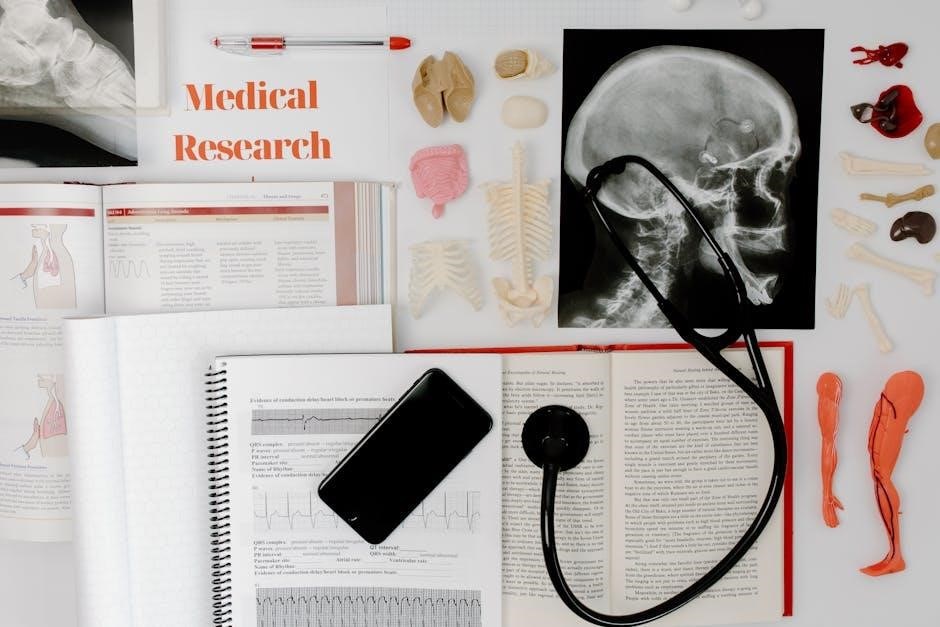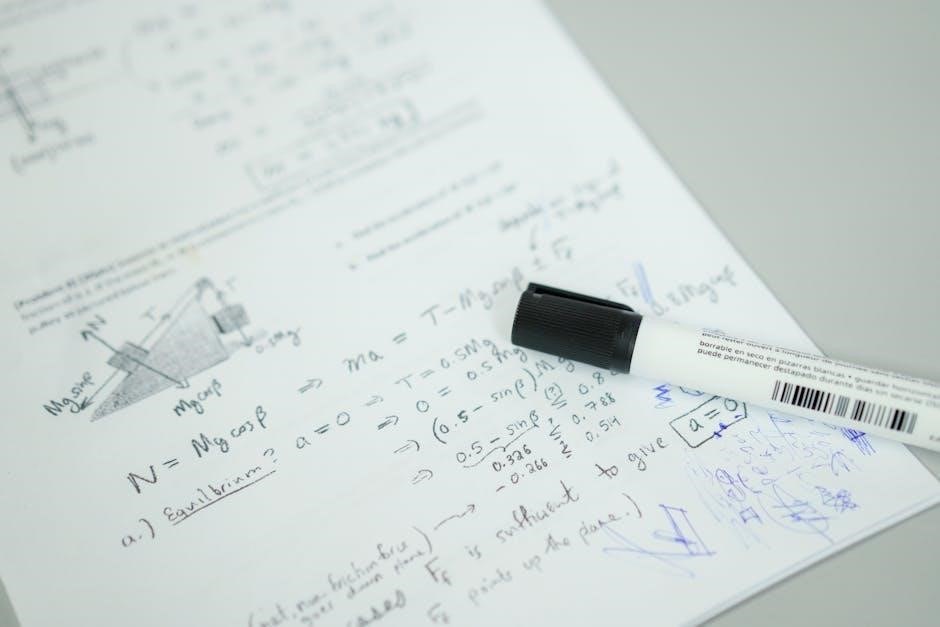year 9 science test papers with answers pdf
Year 9 science test papers with answers in PDF format are essential tools for revision and exam preparation, helping students understand test formats and improve confidence.
1.1 Importance of Year 9 Science Tests
Year 9 science tests are crucial for assessing student understanding and preparation for higher-level studies. These tests evaluate knowledge retention, critical thinking, and problem-solving skills, essential for future academic success. By using past papers with answers, students can familiarize themselves with exam formats, identify weak areas, and improve test-taking strategies. Regular practice with these materials enhances time management and reduces exam anxiety. Additionally, test papers with answers provide a self-assessment tool, allowing students to track progress and refine their understanding of key scientific concepts. This structured approach ensures students are well-prepared to meet curriculum standards and build a strong foundation for advanced studies.
1.2 Benefits of Using Past Papers with Answers
Using Year 9 science test papers with answers offers a practical way to enhance learning and exam readiness. These resources provide insights into exam formats, helping students identify knowledge gaps and strengthen weak areas. By practicing with past papers, students improve their ability to manage time effectively and reduce exam anxiety. Additionally, having access to answers allows for self-assessment, enabling students to evaluate their performance and understand where they need improvement. This structured practice also enhances critical thinking and problem-solving skills, essential for academic success. Regular use of these papers fosters confidence and ensures students are well-prepared to tackle challenging questions during actual exams.

Structure of Year 9 Science Test Papers
Year 9 science test papers typically include multiple-choice questions, structured essays, and practical tasks, divided into clear sections with specific time allocations for each segment.
2.1 Format and Duration of the Tests
The Year 9 science test papers typically follow a standardized format, with a duration of 60 minutes, as seen in examples like the Dulwich College papers. The tests are divided into clear sections, often containing multiple-choice questions, short-answer responses, and structured essays. Students are expected to answer all questions within the allocated time, with detailed instructions provided at the beginning of the paper. The format ensures a fair assessment of knowledge and understanding, while the time constraint helps students practice effective time management. Additionally, the availability of these papers in PDF format, along with answers and marking schemes, allows for comprehensive revision and self-assessment.
2.2 Types of Questions Included
Year 9 science test papers include a variety of question types to assess different skills and knowledge levels. Multiple-choice questions test quick recall and understanding, while short-answer questions require concise explanations. Structured essays allow students to demonstrate in-depth knowledge and critical thinking. Practical-based questions, such as data analysis or experimental interpretations, evaluate problem-solving abilities. Additionally, some papers include extended-response questions that require detailed explanations of scientific concepts. The mix of question types ensures a comprehensive assessment of students’ understanding across biology, chemistry, and physics. Examples of these question types can be found in past papers from institutions like AQA and Edexcel, providing students with a clear idea of what to expect.

Key Topics Covered in Year 9 Science Tests
Year 9 science tests cover essential topics like energy, forces, cells, chemical reactions, and genetics, ensuring a solid foundation for higher-level studies.
3.1 Biology Topics
Year 9 biology test papers typically cover key areas such as cell structure, transport, and division, genetics, ecosystems, and human biology. Students are assessed on their understanding of cellular processes, including photosynthesis and respiration. Genetics topics include inheritance patterns, DNA structure, and basic Mendelian laws. Ecosystems focus on food chains, energy flow, and interactions between organisms and their environment. Human biology sections often explore the skeletal and muscular systems, digestive processes, and the immune system. Additionally, students may encounter questions on plant anatomy and environmental biology. These topics are designed to build foundational knowledge and prepare students for advanced biological concepts in higher grades. Regular practice with past papers helps reinforce these areas effectively.
3.2 Chemistry Topics
Year 9 chemistry test papers focus on foundational concepts, including atomic structure, the periodic table, and chemical bonding. Students are assessed on their understanding of chemical reactions, acids and bases, and the properties of materials. Topics such as the periodic table trends, ionic and covalent bonding, and chemical equations are commonly covered. Additionally, questions on states of matter, gas laws, and environmental chemistry, like air and water pollution, are often included. These topics aim to develop problem-solving skills and a deeper understanding of chemical principles. Practicing with past papers helps students familiarize themselves with the format and improve their ability to answer chemical calculations and theoretical questions confidently. Regular revision ensures a strong grasp of these essential concepts.

3.3 Physics Topics
Year 9 physics test papers cover a range of fundamental concepts to build a strong foundation. Key topics include forces and motion, such as Newton’s laws, friction, and momentum. Energy transfer and conservation are also emphasized, along with electrical circuits, including Ohm’s law and circuit diagrams. Students are tested on wave properties, including sound and light waves, and their applications. Additionally, topics like simple machines, levers, and gears are included to understand mechanical advantage. These questions aim to develop analytical and problem-solving skills. Regular practice with past papers helps students master calculations and theoretical explanations. Understanding these physics concepts is crucial for progressing to higher-level science studies.

How to Use Year 9 Science Test Papers Effectively
Effectively using Year 9 science test papers involves simulating exam conditions, identifying weak areas, and tracking progress. Regular practice helps build confidence and improves problem-solving skills.
4.1 Setting Up a Study Schedule
Creating a structured study schedule is essential for effective preparation using Year 9 science test papers. Start by breaking your study sessions into manageable time blocks, dedicating specific periods to each subject area. Allocate days for practicing past papers and reviewing answers to ensure consistent progress. Prioritize topics you find challenging and balance them with stronger areas to maintain a well-rounded understanding. Set realistic goals for each study session and track your progress. Incorporate regular breaks to avoid burnout and maintain focus. Consistency is key; stick to your schedule and adjust it as needed based on your performance and evolving needs. A planned approach ensures efficient use of time and resources.
4.2 Practicing Under Exam Conditions
Practicing Year 9 science test papers under exam conditions helps build exam readiness and time management skills. Set a timer for the duration of the test and attempt questions without interruptions. Use past papers to simulate the actual test environment, ensuring you follow the same format and structure. This practice helps you become familiar with the question types and pacing yourself effectively. Create a quiet, distraction-free space to mimic exam conditions. Regularly reviewing your answers and identifying areas for improvement is crucial. By replicating the exam experience, you can reduce anxiety and develop strategies to stay calm and focused during the actual test. Consistent practice under timed conditions enhances your ability to perform well.
4.3 Reviewing and Learning from Mistakes
Reviewing and learning from mistakes is crucial for improving performance in Year 9 science tests. After completing practice papers, carefully analyze incorrect answers using the provided mark schemes and sample answers. Identify the root cause of each error, whether it’s a misunderstanding of concepts or time management issues. Categorize mistakes by topics or question types to focus on weak areas. Regularly reviewing these patterns helps reinforce learning and reduces recurring errors. This process fosters a growth mindset, encouraging students to view mistakes as opportunities for improvement. By systematically addressing errors, students can develop a deeper understanding of scientific concepts and enhance their overall test performance effectively.

Answer Keys and Marking Schemes
Answer keys and marking schemes provide clear solutions and grading criteria for Year 9 science test papers, ensuring accurate self-assessment and understanding of performance levels.
5.1 Understanding the Marking Criteria
Understanding the marking criteria is essential for accurately assessing performance in Year 9 science tests. Marking schemes typically outline how points are allocated for each question, ensuring consistency and fairness. By reviewing the criteria, students can identify how their answers align with expectations and where improvements are needed. For example, marks may be awarded for accurate scientific terminology, logical reasoning, or proper use of formulas. Familiarity with the criteria also helps students focus on key aspects of questions during revisions, such as structuring responses effectively or addressing all parts of a question. This insight enables learners to refine their approach and achieve higher scores in future assessments. Regularly referencing marking schemes enhances study habits and exam strategies, fostering better academic outcomes.
5;2 Interpreting Sample Answers
Interpreting sample answers in Year 9 science test papers with answers PDF is a valuable study tool. These answers demonstrate how to structure responses clearly and concisely, aligning with the marking criteria. By comparing personal answers to the samples, students can identify gaps in their knowledge and improve their understanding. Sample answers highlight key scientific concepts, proper terminology, and logical reasoning. They also show how to present calculations and diagrams effectively. Reviewing these examples helps learners recognize common mistakes and refine their techniques. Over time, this practice enhances problem-solving skills and boosts confidence in tackling exam questions; Regularly analyzing sample answers is a proven way to improve test performance and deepen scientific comprehension.

Revision Strategies for Year 9 Science
Effective revision involves creating flashcards for key terms, using diagrams to visualize concepts, and summarizing notes into concise study guides. This approach ensures comprehensive preparation.
6.1 Creating Flashcards for Key Concepts
Creating flashcards is a highly effective revision strategy for Year 9 science. Flashcards help students memorize key terms, formulas, and concepts by breaking them down into manageable chunks. For each flashcard, write a scientific term or concept on one side and its definition, explanation, or example on the other. This method encourages active recall, a powerful technique for retaining information. Flashcards can also include diagrams or equations, especially for topics like biology, chemistry, and physics. Organize them by topic or unit to focus on specific areas of weakness. Regularly reviewing flashcards helps build confidence and ensures a strong grasp of fundamental concepts before exams.
6.2 Using Diagrams and Visual Aids
Diagrams and visual aids are invaluable tools for Year 9 science revision, especially for understanding complex concepts. Visual learning helps students grasp relationships between components, such as cell structures in biology or chemical reactions in chemistry. By sketching and labeling diagrams, students engage actively with the material, enhancing retention. Color-coding and highlighting key parts of diagrams can make them more effective. Additionally, comparing student-drawn diagrams with those in textbooks or test papers helps identify gaps in understanding; Visual aids like flowcharts and mind maps are also useful for organizing information logically. Regular practice with diagrams builds confidence and improves problem-solving skills, making them an essential part of science test preparation.

Common Challenges in Year 9 Science Tests
Students often face challenges like time management, complex terminology, and applying concepts to unfamiliar scenarios. These obstacles can hinder performance, emphasizing the need for targeted preparation.
7.1 Time Management During the Exam
Effective time management is crucial during Year 9 science exams, as students often struggle to complete all questions within the allotted time. Many find it challenging to balance detailed explanations with quick multiple-choice answers. To address this, it’s essential to allocate time based on question difficulty and marks. Skim through the entire paper first to identify easier questions and tackle them early, saving time for more complex sections later. Practicing under timed conditions with past papers helps build familiarity with the exam format and improves speed. Developing a personal strategy, such as spending 50% of the time on structured questions and 30% on open-ended ones, ensures efficient use of time. Regular practice with past papers enhances both accuracy and speed, reducing exam anxiety and improving overall performance.
7.2 Understanding Complex Scientific Terminology
Mastering complex scientific terminology is a significant challenge for Year 9 students, as it forms the foundation of many exam questions. Terms like “photosynthesis,” “atomic structure,” and “ecosystems” often confuse students due to their intricate definitions. To overcome this, students should break down terms into root words, prefixes, and suffixes, which can help in deciphering meanings. Regular use of past papers with answers allows learners to identify frequently tested terms and focus on understanding their contexts. Additionally, creating a glossary of key terms and revising them consistently can improve retention. Teachers and parents can support students by encouraging the use of flashcards and providing real-world examples to simplify complex concepts. This targeted approach ensures students grasp terminology effectively, boosting their confidence and performance in exams.

Additional Resources for Year 9 Science Preparation
Supplement your learning with online platforms offering practice questions, interactive simulations, and video tutorials. Utilize study guides, worksheets, and educational apps to reinforce concepts and improve understanding.
8.1 Recommended Websites for Practice Questions
Several websites provide excellent resources for Year 9 Science test preparation. Khan Academy offers free practice questions and video explanations, covering biology, chemistry, and physics. BBC Bitesize is another reliable platform, featuring interactive lessons and quizzes tailored to the UK curriculum. For a wider range of practice questions, Quizlet provides flashcards and tests on various science topics. Additionally, Education.com offers downloadable worksheets and online exercises. These websites are ideal for reinforcing concepts and improving problem-solving skills. Regular practice on these platforms can significantly enhance exam readiness and confidence in tackling Year 9 Science test papers effectively.
8.2 Utilizing Study Guides and Worksheets
Study guides and worksheets are invaluable resources for Year 9 Science preparation. They provide structured content, focusing on key concepts and exam-style questions. Many study guides, such as those from Collins Connect or CGP Books, include detailed explanations and answers, helping students identify areas for improvement. Worksheets are particularly useful for targeted practice, allowing learners to focus on specific topics like biology, chemistry, or physics. Regular use of these materials enhances understanding and retention of scientific principles. Additionally, worksheets can be used to track progress over time, helping students and teachers identify strengths and weaknesses. Incorporating these tools into a study routine ensures comprehensive preparation for Year 9 Science test papers.

Tips for Parents and Teachers
Parents and teachers play a crucial role in supporting Year 9 Science students. Encourage regular practice with past papers, provide a study-friendly environment, and stay involved in their progress. Offering guidance on understanding complex concepts and fostering a growth mindset can significantly boost their confidence and performance in tests.
9.1 Supporting Students with Test Preparation
Teachers and parents can effectively support Year 9 students by creating a structured study plan tailored to their needs. Encourage the use of past papers with answers to familiarize students with test formats and build confidence. Break down complex topics into manageable sections and provide clear explanations. Regularly review progress, identify weak areas, and offer additional resources like videos or interactive tools. Foster a positive environment by celebrating small achievements and emphasizing effort over perfection. Encourage students to ask questions and seek help when needed. By being actively involved, parents and teachers can help students develop a strong foundation and improve their test performance. Use of flashcards and group discussions can also enhance their learning experience. Regular breaks and a balanced routine are essential to maintain focus and reduce stress. Providing access to additional practice materials, such as worksheets or online quizzes, can reinforce their understanding. Parents and teachers should also communicate regularly to align their support strategies and ensure consistency. This collaborative approach ensures students feel supported and prepared for their Year 9 Science tests.
9.2 Encouraging Regular Practice
Consistent practice is vital for Year 9 students to excel in science tests. Parents and teachers should encourage students to allocate specific times daily for studying and practicing past papers. Creating a routine helps build discipline and ensures steady progress. Encourage students to attempt practice tests under timed conditions to simulate exam scenarios, boosting their speed and accuracy. Regular review of mistakes is essential, as it helps identify areas needing improvement. Parents and teachers can also motivate students by celebrating small achievements, fostering a growth mindset. Providing access to additional resources, such as online quizzes or educational apps, can make learning engaging. Regular practice not only enhances knowledge retention but also strengthens problem-solving skills, preparing students for the challenges of Year 9 science exams. Positive reinforcement and support play a key role in maintaining students’ motivation.
Year 9 science test papers with answers are invaluable for improving knowledge, exam skills, and confidence. Regular practice ensures future success and fosters continuous learning.
10.1 Final Thoughts on Using Test Papers
Using Year 9 science test papers with answers is a highly effective way to prepare for exams. These resources provide students with real exam scenarios, helping them improve time management and reduce anxiety. Regular practice with past papers enhances problem-solving skills and reinforces key scientific concepts. Students gain confidence by familiarizing themselves with question formats and marking schemes. Additionally, the availability of answers allows for self-assessment, highlighting areas that need improvement. Parents and teachers can encourage consistent practice to build a strong foundation for future success. By leveraging these tools, students can approach their exams with greater confidence and a deeper understanding of the material.
10.2 Encouraging Continuous Learning
Using Year 9 science test papers with answers fosters a culture of continuous learning. These resources help students identify knowledge gaps and strengthen their understanding of scientific concepts. By regularly practicing with past papers, students develop critical thinking and problem-solving skills, which are essential for long-term academic success. Encouraging learners to explore additional resources, such as textbooks or online tutorials, complements their preparation. Continuous learning also nurtures curiosity and a deeper appreciation for science. Parents and educators should emphasize the importance of regular study habits and a growth mindset. This approach ensures that students not only perform well in exams but also develop a lifelong love for learning and scientific inquiry.


